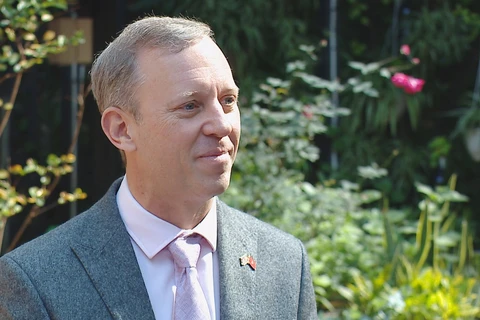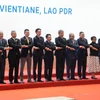 Professor Sir Jonathan Van-Tam, Deputy Chief Medical Officer for England, on shift vaccinating people at a vaccination centre (Photo: VNA)
Professor Sir Jonathan Van-Tam, Deputy Chief Medical Officer for England, on shift vaccinating people at a vaccination centre (Photo: VNA) From January 27, England removes all restrictions under the Government’s Plan B to tackle COVID-19, even though the number of new infections remain high. Vietnam News Agency correspondents in London talked with Professor Sir Jonathan Van-Tam, Deputy Chief Medical Officer for England, on this decision as well as his forecast for developments of COVID-19 in 2022, and Vietnam’s strategy to fight the pandemic.
According to Professor Sir Jonathan Van-Tam, the reason behind England’s removal of Plan B is that the country had a very sharp Omicron wave, which, however, is now declining quite fast as well.
At the beginning of the Omicron wave, no one knows for sure how well vaccines would hold up. But now, it is clear in the UK that the vaccines are very effective in preventing serious diseases, even though they are rather less effective in preventing infections.
As vaccines can very effectively prevent serious diseases, the burden on hospitals is manageable, Professor Van-Tam said, adding that there are still quite a lot of cases around, but the NHS is not under severe threat. Because cases are now starting to decline, he hoped that hospitalisations, which will take a bit longer to decline, will also start to decline quite soon.
The deputy chief medical officer said the UK has always been very clear that it wants to do as much as possible to protect the hospital system and the National Health Service (NHS), but never more than that, because the more restrictions the Government imposes, the more economic damage and social damage that costs. So it's a very difficult balancing decision to protect the NHS enough but also to do only with minimum amount of other damage.
He also said the UK is in a very good position because it has had a very successful vaccine campaign with a very large proportion of the population having had two doses. In terms of the booster dose, which is now given, over 90 percent of the over 50s now have a booster. The 50s are the group that has the greatest chance to have been really sick with COVID-19 and ending up in hospitals or even dying.
He concluded England can take these restrictions away because of the strength of the vaccination programme.
Speaking about the development of COVID-19 in 2022, given that Omicron is seen as milder than other variants, Sir Van-Tam stressed that when saying Omicron is mild, we have to be careful, pointing out that Omicron is only milder than Delta, the variant that came before Omicron.
He said Omicron is quite a bit milder and the likelihood that this variant will put an infected person into hospital or kill them is lower, pointing out that Omicron is milder partly because the virus itself is milder, partly because Omicron has burst into the world in many populations that were already highly vaccinated. Now Omicron has come to many parts of the world, it seems to have gone up very fast indeed and come down quite fast too.
According to Professor Van-Tam, in the UK it has only just started to turn the corner, but hopefully it is going to continue to decline in the next few weeks. Yet, he stressed that this does not mean the pandemic is over, and this question cannot be answered.
Assessing about the possibility for the appearance of new variants, Professor Van-Tam said the infectious Omicron is very well adapted to humans. It transmits very regularly between people and can get into the human cell in two different ways, which is new as compared with Delta. Because it is so well adapted, it makes it harder for another variant to come in the future and outcompete Omicron.
 Professor Van-Tam with players from Boston United Football Club at the Mass Vaccination Centre in Boston, Lincolnshire (Photo: VNA)
Professor Van-Tam with players from Boston United Football Club at the Mass Vaccination Centre in Boston, Lincolnshire (Photo: VNA) Professor Van-Tam predicted there will be troublesome outbreaks probably at least in the winter seasons for a few years to come, but hopefully after a few years, it's going to settle down and become something that can be managed in a very normal way, a bit like how flu is managed.
With regard to Vietnam’s strategy to fight COVID-19, Professor Van-Tam said when the pandemic started, Vietnam had one of the lowest death rates and the lowest case numbers in the world, saying the country had been very successful in controlling the virus in the same way as Australia and New Zealand did.
But he said Vietnam is right to change its strategy from zero-COVID-19 to safe adaptation because what is now known about vaccines is that whilst they are highly effective in keeping down hospitalisations and deaths, they are not as successful in eliminating infections altogether. This means we cannot rely on vaccines just to have an infection-free society but to have a society where serious illness, hospitalisations and deaths are kept to a very low level.
He pointed out the kind of restrictions needed to just stop infections in society do all sorts of other damage, not just economic damage, but social damage if people can’t meet up with their families and can’t travel, and mental health damage as well, for people who cannot go out and have to stay in their homes for long periods of time.
He said vaccines will be important in several years, especially the booster programme because after a period of time, vaccine effectiveness starts to turn down, recommending the booster programme should continue at least in the elderly and the high-risk groups for a few more years. Professor Van-Tam said this is how the world has to manage the virus in the long run, because life has to go on and the key is the vaccination strategy, targeting with people who are most at risk./.























